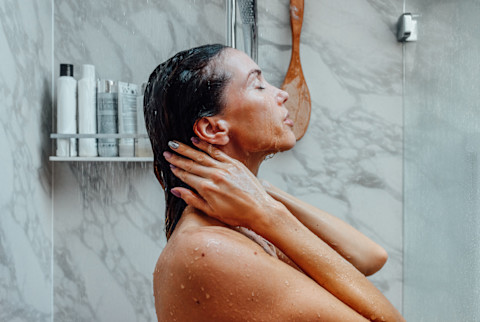
New Year's resolutions may come and go, but good sleep is something we should all be committing to every year.
Restorative rest starts with a solid wind-down routine. And while everyone's will look a little different, there are some universally relaxing habits that you can include in yours to prepare your body for deep sleep. One of the most enjoyable that definitely deserves a spot in your 2022 rotation? Taking a hot shower or bath.
The research on showers and sleep.
Nishi Bhopal, M.D., a psychiatrist specializing in sleep medicine, is one expert who swears by the nightly soak. According to Bhopal, taking a hot shower or bath before bed promotes sleep due to the way it affects our core body temperature (the temperature of our internal organs).
Our body's core temp, Bhopal explains, naturally fluctuates throughout the day with our circadian rhythm. About an hour before bedtime, it drops around 0.5 to 1 degree Fahrenheit. This sends the signal to the body that it's time to rest. (It's also why you might feel yourself getting colder as the night goes on and you become more tired.) Our core body temperatures continue to dip until about halfway through our sleep cycle before rising again.
By taking a strategically timed hot shower, you're enhancing this natural dip and sending a relaxing signal to your body in the process. If you're scratching your head wondering why taking a hot shower would make us colder, Bhopal says that as the heat of the water increases blood flow to your extremities, it leaves your core body temperature to cool down.
"You'll feel warmer, but that's because the temperature in your extremities is increasing. Your core body temperature is actually decreasing," she tells mbg.
To pinpoint the ideal temperature and time window for a pre-bed shower or bath, researchers at The University of Texas at Austin combined the available data into a 2019 meta-analysis in Sleep Medicine Reviews1.
They concluded that the temperature range associated with falling asleep quicker and reporting better sleep quality was 40 to 42.5 degrees Celsius (104 to 108.5 degrees Fahrenheit). Sounds hot, right? Well, the average water temperature for a shower in the U.S. is around 105 degrees Fahrenheit, so you shouldn't have to adjust your typical temp too much to hit this ideal range.
Researchers added that taking your shower or bath one to two hours before bed will give you a good shot at aiding the natural circadian process and getting yourself ready for sleep. This might be an especially helpful habit for night owls or those who struggle to stick to a consistent bedtime.
The takeaway.
Taking a hot shower or bath one to two hours before your bedtime can cool down your core body temperature, prepping you for better sleep in the process.
Once you wrap up in the tub, doctor of chiropractic and functional medicine expert Stacie Stephenson, D.C., CNS, recommends easing into the rest of your wind-down routine. You can lather on some lotion, read a book, meditate, spend time with loved ones, journal on your day, take a sleep-promoting supplement—whatever's on the soothing menu that night.* Just avoid anything that will cause you to heat up again, such as vigorous exercise.
Cheers to more nights in the new year that are relaxing down to the core.

